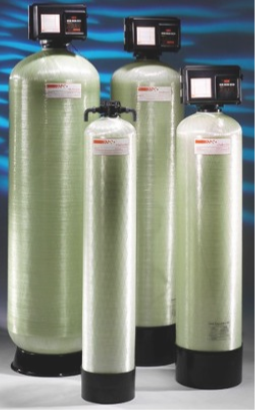
Water Softener
(Industrial, commercial)
Water softener is a simple but the most efficient system to deal with hard water issues and of all the known methods, leaves the least effects. As soon the water started to pass through water softener, the system quickly begins paying off for itself through reduced energy consumption, extended water appliance life, and lower equipment and plumbing repairs. With soft water, water heaters and boilers last longer; saves costly specialty chemicals for boilers and steam handling equipment. It is also widely used as pre-treatment systems for RO/ NF systems and help these systems run with minimal operational issues and helps reduce membrane cleaning /replacement frequency.
Most water carry various dissolved salts including calcium (Ca2+) and magnesium (Mg2+) which specifically contributes to water hardness. Depending upon the Ca2+ and Mg2+ contents in water, water hardness increases risk for clogging pipes, produces scales and deposits, effect heat transfer rates in boilers and other heat transfer equipment, overheat design system’s parameters, effect washing process and increase soap and detergent consumption etc. Scale build up means more energy is required to heat the water that results in an increase in normal power / energy bills. Various technologies are available to reduce water hardness and make water suitable for any industrial, commercial and household water systems.
Water softening systems are used to reduce the hardness from the water and avoid hardness related problems during the specific quality water use. Many water softening techniques are available to reduce water hardness among which ion exchange is the post popular technology.
Ion exchange water softening uses specific ion exchange resins technology to remove naturally occurring minerals such as calcium and magnesium (which cause hardness in water) from water to prevent scale /deposits buildup in pipes and associated appliances. It mainly removes Ca2+ & Mg2+ ions by replacing them with other ions (Na+). The process is widely used in most industrial and commercial setups to ensure that all heating and cooling systems run smoothly at their designed parameters. Water softeners support run system with reduced energy losses, lower energy bills and help achieve best operating performances by extending the life expectancy of water-handling equipment and other process equipment.
- Reduced scaling/ keeps heat transfer surface clean
- Reduced energy consumption
- Reduced equipment breakdown & lost production hours
- Reduced energy bills
- Eliminate un-necessary repair and maintenance
- Save fuel & your money
- Ensure quality textile dyeing and printing
- Keep uniform fabric colour
- Reduces scaling on RO / NF/ UF membranes
- Reduced water losses
- Reduced RO/ NF membrane cleaning
- Enhance cleaning
- Reduced water treatment chemical consumptions
- Reduce CO2 emissions
- Saves thousands on chemical usage
- Environment friendly
- Extended equipment/appliance life
- Reduced chemical consumption
- Ensure smooth heating and cooling operation
- Boiler feed water
- HVAC systems
- Cooling water treatment
- Re-circulation systems
- Process industry
- RO pre-treatment
- Humidification and air conditioning
- Manufacturing plants
- Energy & power generation
- Industrial process water
- Food & beverage
- Dairy industries
- Textile dyeing, printing & finishing
- Textile weaving & spinning
- Apartments, condominiums & homes
- Motels & resorts
- Public buildings
- Universities & colleges
- Educational facilities
- Commercial laundries
- Agricultural
- Service stations/ car wash
- Hospitals, medical and dialysis
- Hotels, restaurants & catering
- Swimming pools & leisure
- Pharmaceutical
- High flow capacity systems also available 0-200 m3/hr
- Corrosion resistant tanks, internals and piping
- Available in varying sizes and configurations
- Simple design for ease of operation setting and service
- Can be configures as simplex, duplex triplex, Quadruple etc to match your flow requirements
- Comes with high capacity cross-linked virgin softening resin
- Various control mode such as manual, semi-automatic, automatic available
- Individual valve nest /Multiport valve options available
- Automatic brine injections system for small-medium size system
- Automatic backwash flow controllers insuring proper backwash regardless of inlet water pressure
- An automatic brine float valve controls brine draw and regulates fresh water refill and avoids overflow
- Can be coupled with any other pre-post water treatment system
- Comes with inlet water and outlet soft water sample valves
- Easy to install and operate
- Low power requirements
- Requires minimal maintenance
- Spares available
Parameters effecting the system design / Water softener size selection support (Input required as per your requirements) *
Feed water hardness (ppm CaCO3)
¨ Average flow rate required (m3/hr)
¨ Daily soft water required (m3)
¨ Configuration choice (Simplex, Duplex, Triplex, Quad)
¨ Media tank material (Fiberglass (RFP), MS/CS internally rubber lined)
¨ Piping material (PVC, MS, GI, HDPE)
¨ Control mode (Manual, semi-automatic, automatic (Timer based/ Volumetric control))
¨ Brine feed (Injector, SS/PVC pump)
¨ Instruments and control (SS Pressure gauge (Inlet/outlet), backwash flow controller, flow meter, tank level controller, PLC, etc)
¨ Feed water storage tank (Yes/No)
¨ If yes to FWST (Capacity in m3)
¨ Feed water storage tank material (HDPE, Fiberglass, RCC)
¨ Feed water pump (Yes/No)
¨ Feed water pressure (psi)
¨ Feed water pump material (MS, PVC, SS)
¨ Soft water storage tank (Yes/No)
¨ If yes to SWST (Capacity in m3)
¨ Soft water storage tank material (HDPE, Fiberglass, RCC)
¨ Pre-treatment options (Sand filter, carbon filter, cartridge filter, iron filter or other)
¨ Parallel and series arrangements
* Some of these may sharply increase the cost
